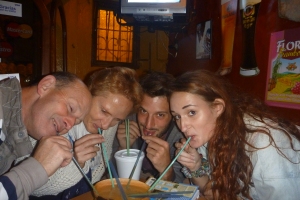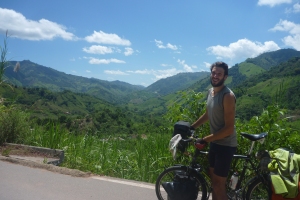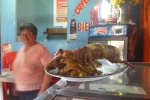 Coincidentally, and mainly thanks to Rebs’ sister Beany living in Cartagena, two of our last weeks in South America were spent with our families, sharing some of the places we have loved in Colombia. Beanebsolomon(?!) met Pillian (Rebs’ parents…too far with name blending?) in Bogotá, where they tried a lot of new food they enjoyed (with plenty of ‘hmmm I’m suspicious of this not-very-appetising-looking food you’ve put in front of me’ looks), and a lot of new drinks they didn’t. A highlight was probably sharing a fishbowl of fermented sweetcorn drink, which Pillian tried hard not to spit out. Unfortunately, not even fermented corn could provide us with the Dutch courage to join the couple salsa-ing round the bar we were in. Continue reading
Coincidentally, and mainly thanks to Rebs’ sister Beany living in Cartagena, two of our last weeks in South America were spent with our families, sharing some of the places we have loved in Colombia. Beanebsolomon(?!) met Pillian (Rebs’ parents…too far with name blending?) in Bogotá, where they tried a lot of new food they enjoyed (with plenty of ‘hmmm I’m suspicious of this not-very-appetising-looking food you’ve put in front of me’ looks), and a lot of new drinks they didn’t. A highlight was probably sharing a fishbowl of fermented sweetcorn drink, which Pillian tried hard not to spit out. Unfortunately, not even fermented corn could provide us with the Dutch courage to join the couple salsa-ing round the bar we were in. Continue reading
Category Archives: Colombia
Colombia’s Caribbean Coast: Thirty Days, Twenty-one Coconuts
 Cycling into Cartagena to spend time with Rebs’ youngest sister, Beany, we had a surprise reunion with Anderson, a lorry driver who picked up our conversation as if five months and 1,600km hadn’t passed since our last chance encounter. We were flabbergasted.
Cycling into Cartagena to spend time with Rebs’ youngest sister, Beany, we had a surprise reunion with Anderson, a lorry driver who picked up our conversation as if five months and 1,600km hadn’t passed since our last chance encounter. We were flabbergasted.
Cartagena bills itself as the jewel of South America, a ‘must’ on all guidebooks’ itinerary lists. The colourful, well-maintained architecture of the old town, the backdrop of the sea, the abundant Caribbean fruits sold on the streets: its first impression fulfils the hype. However, the constant offers of cocaine, prostitutes and artisan products – the seedy consequence of Cartagena’s appeal to tourists – are wearing.
The heat was so fierce that when not with Beany, we sat under the fan in our room, meaning endless episodes of our new favourite series, The Bachelorette, with Sol showering in every ad break. Continue reading
Colombia’s Antioquia Province: Freewheeling in Peace
 The cycling in the countryside around Medellin was some of the most picturesque we can remember. Quiet lanes took us freewheeling down sunshine-covered coffee mountains, and alleys of sugar cane flanked us as we crawled up the other side of the valleys.
The cycling in the countryside around Medellin was some of the most picturesque we can remember. Quiet lanes took us freewheeling down sunshine-covered coffee mountains, and alleys of sugar cane flanked us as we crawled up the other side of the valleys.
We had even more shouted encouragements and gifts of food than normal, possibly benefitting from the reflected glory of Nairo Quintana, the young Colombian cyclist who had just come second in the Tour de France. Despite finding ourselves with only £1.50 in cash, we sailed through the next eight days without a cash machine almost without noticing. We also had a slightly absurd request for ALL of our remaining water from a woman overtaking us on a motorbike, who complained she was thirsty while finishing off a jumbo pack of Doritos. She instructed us to ask at the upcoming houses for a re-fill, just five minutes up the hill by motorbike… or thirty thirsty sweaty minutes on a bicycle…
Colombia’s Zona Cafetera (2): Our Farm of the Future
 It was in the Zona Cafetera we undertook our third farming ‘apprenticeship’ on our long road towards being fully fledged farmers. Thanks to having spent four months working on other farms and most of our time cycling through the countryside, it was refreshing to arrive feeling like we had some knowledge and insights to offer. The farm, El Albergue Azul, came at the perfect time in our journey towards agricultural enlightenment. The farm focuses on food sovereignty: prioritising growing food to eat rather than for profit. The relaxed order that comes from farming organically in this manner has created a vibrant haven of biodiversity, tucked away among the monoculture of coffee farms that surrounds it. It is a blueprint for the RebSolomon farm of the future.
It was in the Zona Cafetera we undertook our third farming ‘apprenticeship’ on our long road towards being fully fledged farmers. Thanks to having spent four months working on other farms and most of our time cycling through the countryside, it was refreshing to arrive feeling like we had some knowledge and insights to offer. The farm, El Albergue Azul, came at the perfect time in our journey towards agricultural enlightenment. The farm focuses on food sovereignty: prioritising growing food to eat rather than for profit. The relaxed order that comes from farming organically in this manner has created a vibrant haven of biodiversity, tucked away among the monoculture of coffee farms that surrounds it. It is a blueprint for the RebSolomon farm of the future.
Colombia’s Zona Cafetera (1): Smell the Coffee, Don’t Eat the Tripe

Our friends Andrew and Nelly, sharing their cooking prowess (encouraged by the threat of a headlock from Rebs)
People embark on cycle tours for a number of different reasons. For us, cycling has been a great excuse to eat more. Until that is, we encountered boiled tripe, when we had to use all our creativity to sneak it back onto the communal serving plate. We felt lost in the world: what are we if not rampant food-consumers?
Guillermo and Miguel, our Argentinian friends of karaoke fame in Huila, popped up again to help us out with a night of gnocchi making (and eating). Guillermo has made gnocchi on the 29th of every month of his adult life in homage to its origins. Made from potatoes and wheat-flour, it is one of the cheapest and most filling meals around, traditionally made just before payday when money was tight. We were introduced to this Italian tradition in Pereira, in the centre of the Zona Cafetera, Colombia’s coffee growing heartland.
Colombia’s Valle Province: Salsa and its Dangers
 Cali, capital of Valle province, is also the self-declared world capital of salsa…our hip-wiggling moment had arrived. Watch out Colombia! No, really, watch out. Our first foray into the world of salsa started in a local club in a small town just outside Cali, it ended when Sol, determined to impress, made an even bigger fool of himself than anticipated, when an enthusiastic pelvic thrust backfired and he clattered backwards into a thankfully empty chair. The pelvic thrust is not a salsa move. Continue reading
Cali, capital of Valle province, is also the self-declared world capital of salsa…our hip-wiggling moment had arrived. Watch out Colombia! No, really, watch out. Our first foray into the world of salsa started in a local club in a small town just outside Cali, it ended when Sol, determined to impress, made an even bigger fool of himself than anticipated, when an enthusiastic pelvic thrust backfired and he clattered backwards into a thankfully empty chair. The pelvic thrust is not a salsa move. Continue reading
Colombia’s Huila Province – Worms ‘n’ All
 Disembodied voice from the woods: ‘Oye! Colombia es lo máximo!’
Disembodied voice from the woods: ‘Oye! Colombia es lo máximo!’
RebSolomon: ‘Si, Colombia es lo máximo!’
Disembodied voice from the woods: ‘Les gusta chocolate?’
Like a five-year old being offered a lolly by a stranger, we threw down our bikes and ran towards the offer of hot chocolate. Under a barbed wire fence, through the first line of trees, round a corner and we walked into breakfast with a military guerrilla tracking unit. The twenty soldiers forced us to have photos taken with their guns, finding it hysterical that we were scared of firing them by mistake, and to have a second breakfast and tankard of hot chocolate. Our only moment of slight awkwardness was when we noticed the soldiers talking secretively into their radio, and then asking Rebs if by any chance she was the Dutch woman known to be fighting with the Colombian guerillas. Unwittingly, the military had revealed their Plan A for catching guerillas: asking passers-by on the off chance they’ll own up. Continue reading
Colombia’s Cauca Province: A Tale Of Two Religions
 Our time in Cauca was spent cycling through what is locally known as the ‘boot’ of the province. It is an isolated section, sandwiched between states which the Cauca people feel culturally closer to. Their situation creates a separatist, and at times resentful, mindset – many people live without post or internet and so have to travel twenty hours to the regional capital every time they need to deal with a government body for school enrollment, a driving license or a tax query.
Our time in Cauca was spent cycling through what is locally known as the ‘boot’ of the province. It is an isolated section, sandwiched between states which the Cauca people feel culturally closer to. Their situation creates a separatist, and at times resentful, mindset – many people live without post or internet and so have to travel twenty hours to the regional capital every time they need to deal with a government body for school enrollment, a driving license or a tax query.
Combine this with a large ethnic minority and you find communities with a tendency towards territorial independence. Obviously, the indigenous groups predate the Spanish, and so do their laws and traditions. Although legally independent – not answerable to Colombian law – these groups remain a marginalised minority within Colombia. For many of them, it’s a logical and just next step to declare their region an autonomous indigenous territory where this would no longer be the case. One of the many people who spoke to us about this was a female taita (shaman and indigenous elder), Maria, who we stayed with. She initially seemed a bit hesitant with us. We sat down with a cup of English Breakfast tea (cultural invasion in practice) to find out why. Continue reading
Colombia’s Putumayo Province: Trespassers Will Be Shot
 Putumayo is renowned within Colombia as one of the few states where guerillas still have a strong presence. Warned countless times by people in the neighbouring big city not to go, we cycled to the limit of the so-called ‘safe zone’, had a look around, ‘Nope, no guerrillas here!’… so kept on cycling.
Putumayo is renowned within Colombia as one of the few states where guerillas still have a strong presence. Warned countless times by people in the neighbouring big city not to go, we cycled to the limit of the so-called ‘safe zone’, had a look around, ‘Nope, no guerrillas here!’… so kept on cycling.
Colombia’s Nariño Province – On Cloud Colombia
 Our 32 day illegal stay in Ecuador had not gone unnoticed: we were stuck between countries, having signed a form we didn’t understand and been told to come back in an hour. As we waited, we met a family from Herefordshire, taking two years to cycle from Mexico to Argentina with their ten and twelve year old sons. They made us rethink what it means to settle down; an inspiration for our future family trip with Nico and Isabela.
Our 32 day illegal stay in Ecuador had not gone unnoticed: we were stuck between countries, having signed a form we didn’t understand and been told to come back in an hour. As we waited, we met a family from Herefordshire, taking two years to cycle from Mexico to Argentina with their ten and twelve year old sons. They made us rethink what it means to settle down; an inspiration for our future family trip with Nico and Isabela.
It was a happy anticlimax when we were eventually waved through the border. Colombia is magic. Back in the country after our four month jaunt in Ecuador, Day One (take two) shows why… Continue reading
